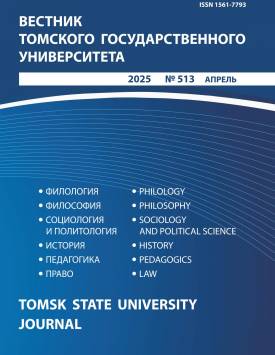Scientific and technical partnership in the process of creating an interstate telecommunications system of the Eastern Bloc countries (late 1950s)
The article aims to trace the process of creating an interstate telecommunications system of the countries of the socialist commonwealth on the eve of the formation of a specialized structure - the Organization for Cooperation of Socialist Countries in the Field of Electrical and Postal Communications (late 1950s). The role of scientific and technical cooperation in this process, the basic directions and priorities of such a partnership are established. The artivle shows how, during the unfolding confrontation between the "capitalist" and "socialist" worlds, the Soviet Union, as one of the poles of the emerging bipolar world, made efforts to build its "external" telecommunications system, uniting the national communication systems of the states of the socialist camp - including for lobbying its interests in international communication organizations of a global scale. Another important aim to identify the degree of need for institutionalization of interstate partnership in the field of telecommunications is to analyze the state, quantitative and qualitative parameters of the interstate telecommunications complex in the context of its main components: telephone, telegraph and radio communications. Telecommunication networks of the countries of the socialist commonwealth were at different stages of development: each of them had its own size, scale and structure, features of the equipment and technologies used, personnel and administrative-managerial specifics. The general characteristics of the quantitative and qualitative parameters of the interstate telecommunications system of the countries of the socialist camp convincingly showed that this system was at the initial stage of its formation. It was concluded that only coordinated efforts of the member countries of the commonwealth made it possible to create an effective, wellfunctioning system of interstate communications, capable of competing and interacting on an equal footing with similar systems of capitalist states. In addition to technical and technological tasks, the economic and political goals of cooperation in the field of telecommunications are also analyzed. Despite the fact that the unification of the administrative and managerial component was a priority task of combining efforts in the creation of the Organization, the most important economic priorities of the telecommunications sphere were also taken into account. They corresponded, first of all, to the needs of each individual state in profitability, optimal use of personnel, achieving the maximum level of technical development, etc. Among the political tasks of interstate cooperation, it is necessary to pay attention, first of all, to the fact that this way the Soviet Union even more tightly "tied" the participating states to the socialist commonwealth - this time, in the field of telecommunications. Despite the fact that in a political sense the ©organizational foundation of the activities of the Organization were the international agreements reached in the UPU and ITU, the organization was an incomparably more compact and authoritarian association than world-class organizations. The Organization developed politically, economically and technically justified decisions, rather than scientific and technical recommendations, that were binding and were jointly adopted and implemented. The author declares no conflicts of interests.
Keywords
telecommunications, telegraph, telephone, radio communication, international cooperation, socialist countries, eastern blocAuthors
| Name | Organization | |
| Mirkin Vladimir V. | National Research Tomsk State University | vvmvcv@gmail.com |
References

Scientific and technical partnership in the process of creating an interstate telecommunications system of the Eastern Bloc countries (late 1950s) | Vestnik Tomskogo gosudarstvennogo universiteta – Tomsk State University Journal. 2025. № 513. DOI: 10.17223/15617793/513/17
